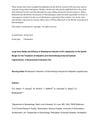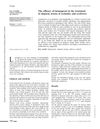November 2024 in “European Journal of Pharmacology” MitoQ may help treat hair loss by boosting hair growth pathways.
 38 citations,
October 2014 in “British journal of dermatology/British journal of dermatology, Supplement”
38 citations,
October 2014 in “British journal of dermatology/British journal of dermatology, Supplement” Bimatoprost solution is effective and safe for long-term use in treating eyelash thinning.
 20 citations,
November 2009 in “European Journal of Dermatology”
20 citations,
November 2009 in “European Journal of Dermatology” Latanoprost, a glaucoma treatment, was found ineffective in treating hair loss in eyebrows and eyelashes.
 4 citations,
September 2020 in “Annals of Translational Medicine”
4 citations,
September 2020 in “Annals of Translational Medicine” Concentrated nanofat helps mice grow hair by activating skin cells and may be used to treat hair loss.
 July 2024 in “Skin Research and Technology”
July 2024 in “Skin Research and Technology” The products significantly promote hair growth and maintain hair bulb health.
 2 citations,
September 2022 in “Cellular and molecular biology”
2 citations,
September 2022 in “Cellular and molecular biology” Agaricus bisporus derived β-Glucan could be an effective cervical cancer treatment with antimicrobial and antioxidant properties.
3 citations,
August 2021 in “Clinical Case Reports” Genetic testing is crucial before giving azathioprine to avoid severe side effects.
 November 2024 in “Skin Appendage Disorders”
November 2024 in “Skin Appendage Disorders” Google trends show varying interest in alopecia types, but it's not a reliable health measure.
1 citations,
January 2024 in “Pharmaceuticals” A new carrier improves skin delivery of tofacitinib for treating inflammatory skin diseases.
 59 citations,
February 2021 in “BMJ”
59 citations,
February 2021 in “BMJ” High doses of cyproterone acetate increase the risk of brain tumors in women, but the risk decreases after stopping the medication.
 June 2017 in “Journal of The American Academy of Dermatology”
June 2017 in “Journal of The American Academy of Dermatology” Finasteride improved hidradenitis suppurativa in kids without side effects.
 13 citations,
October 2017 in “Biomedicine & Pharmacotherapy”
13 citations,
October 2017 in “Biomedicine & Pharmacotherapy” Eclipta alba extract may help treat obesity by blocking fat cell formation and lowering blood lipid levels.
44 citations,
January 2015 in “Development” Human Schwann cells can be quickly made from hair follicle stem cells for nerve repair.
60 citations,
August 2022 in “ESMO Open” Trastuzumab deruxtecan is effective for HER2-positive breast cancer but requires careful management of side effects.
 215 citations,
March 2011 in “Clinical Cancer Research”
215 citations,
March 2011 in “Clinical Cancer Research” Sorafenib is effective in treating Desmoid Tumor/Deep Fibromatosis.
3 citations,
June 2022 in “Cells” The conclusion is that the new method makes collecting cells from plucked hair to create stem cells more efficient and less invasive.
 2 citations,
December 2019 in “Biomedical dermatology”
2 citations,
December 2019 in “Biomedical dermatology” Minoxidil works faster, but ketoconazole is a safer alternative for female hair loss.
1 citations,
May 2017 in “InTech eBooks” New treatments focusing on immune pathways show promise for stubborn hair loss.
 3 citations,
February 2020 in “International journal of women’s dermatology”
3 citations,
February 2020 in “International journal of women’s dermatology” Most women with hair loss take more supplements than average, but these often don't help and can be risky and costly.
 52 citations,
February 1985 in “Archives of Dermatology”
52 citations,
February 1985 in “Archives of Dermatology” Minoxidil absorbs poorly through skin, with low risk of side effects at 1-2% concentration.
 26 citations,
February 2002 in “Urologic clinics of North America”
26 citations,
February 2002 in “Urologic clinics of North America” The document concludes that it's important to understand the placebo effect when evaluating the effectiveness of treatments in medical trials.
 November 2024 in “Cells Tissues Organs”
November 2024 in “Cells Tissues Organs” Stem cells from umbilical cord blood are more effective than minoxidil for treating hair loss.
 January 2025 in “Dermatology and Therapy”
January 2025 in “Dermatology and Therapy” Hormonal therapies effectively treat acne and improve quality of life.
 9 citations,
July 2017 in “Journal of medical case reports”
9 citations,
July 2017 in “Journal of medical case reports” Ruxolitinib treatment may cause eyelash growth.
 6 citations,
January 2018 in “Elsevier eBooks”
6 citations,
January 2018 in “Elsevier eBooks” The U.S. FDA regulates cosmetics for appearance purposes, but not as strictly as some other countries.
15 citations,
January 2019 in “Breast care” Preventive measures and effective management are crucial for reducing skin side effects in cancer treatment.
 August 2024 in “Stem Cell Research & Therapy”
August 2024 in “Stem Cell Research & Therapy” New regenerative therapies show promise for treating hair loss.
8 citations,
November 2018 in “BMC Pulmonary Medicine” A 70-year-old woman with bronchiectasis developed a rare immune disease due to a bacterial infection, requiring a difficult balance of treatments.
 10 citations,
January 2010 in “International Journal of Trichology”
10 citations,
January 2010 in “International Journal of Trichology” Synthetic hair fibers for hair restoration were controversial in 2009 due to health risks and lack of support from the International Society of Hair Restoration.
 12 citations,
December 2013 in “The Journal of Urology”
12 citations,
December 2013 in “The Journal of Urology” Men's age, urinary symptoms, and heart health risks create different types of erectile dysfunction.




















